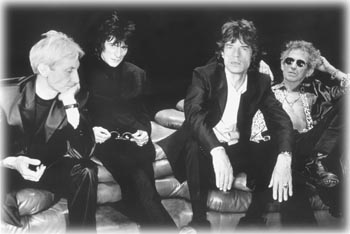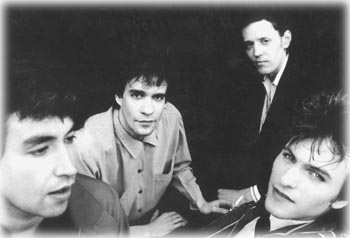![[Metroactive Music]](/music/gifs/music468.gif)
![[Metroactive Music]](/music/gifs/music468.gif)
[ Music Index | Metro | Metroactive Central | Archives ]
A Tale of Two Bands
Old and in the Way: The Rolling Stones lumber down a long slope of decline.
The Stones build 'Bridges to Babylon'; the Replacements are remembered on a two-record set
By Gina Arnold
THE ROLLING STONES' U.S. tour opened in Chicago last week, and according to the reports in the mainstream press, it was well worth attending. Reviewers used many positive but vague words such as "verve" and "stamina" to describe the band's performance, which, reading between the lines, meant the Stones were, as usual, only going through the motions.
The band took the stage--flanked by two giant, naked blowup women, one on her hands and knees, in the spirit of Marv Albert's accuser--90 minutes late. Most tellingly, in a 24-song set, only two numbers came from the band's latest album, Bridges to Babylon (Virgin). Of course, déjà vu is exactly what made critics everywhere enjoy the set; indeed, that the majority of songs were written before 1972 is what made the show tolerable to them at all. But that sense of nostalgia--along with the fact that the Stones began this tour before the new record was even released--is also a tacit admission from the band itself that Bridges to Babylon is trivial and unpromising, a mere excuse for the much more lucrative act of touring.
Bridges to Babylon is a wretchedly underwritten, go-though-the-motions album, mostly composed in the studio by Keith Richards and Mick Jagger last April and May. As on their last, oh, seven albums, the Stones tend to eke out one simple groove and then add some meaningless lyric for Jagger to repeat ad infinitum.
God forbid you should try to find something personal, insightful or deep in lyrics such as "Now we're always suffering / We're already lost"; "If you really want to tear up your mind ... you might as well get juiced"; or "Now I'm out--I'm out of control. Now I'm out--out of control."
The Stones, as always, have the good sense to collaborate with highly acclaimed artists. Here, they use famed producers Don Was, Danny Saber (Michael Hutchence) and the Dust Brothers (Beastie Boys, Beck), as well as the talents of crack musicians Waddy Wachtel, Wayne Shorter and Me'Shell Ndegeocello.
Still, nothing signifies the ennui of Bridges to Babylon better than the first single from the album, "Anybody Seen My Baby?" The song is a direct rip-off of k.d. lang's hit song "Constant Craving"--so much so that the Glimmer Twins (the joint name Jagger-Richards use to write and produce) had to give her co-writing credits rather than face a plagiarism lawsuit. (Sing to yourself "seen-my-bay-bee" to the tune of "con-stant-crave-ing," and you'll see.) "Anybody Seen My Baby?" also contains the rather familiar line "She was just [in] my imagination." And that's the best song on the album--by a long shot.
Meanwhile, for some reason, Richards has been going around dissing the Dust Brothers--who mixed "Anybody Seen My Baby?" and "Saint of Me"--on MTV, although it's hard to understand what he's saying, since he speaks as if he lacked both tongue and teeth.
FOR ALL their lameness, however, the Rolling Stones still clearly command an incredible amount of loyalty and respect in the hearts and minds of both critics and the paying public. Unlike poor U2, the Stones are selling out their tour (it reaches the Bay Area Nov. 14).
The Stones' great hold on the public's imagination (and pocketbooks) begs the question of what engenders such extreme devotion. Something about the music, the men or the legend that surrounds them has invoked much more depth of feeling for the Stones than for any other band or performer except the Beatles and Elvis--and this despite shameless displays of greed and grossness. Perhaps it's just the era of the Rolling Stones' artistic prime--mid-'60s swinging London--that still casts a warm glow of glamour over their every callow gesture.
I can't get behind Stoners fervor myself, but I can imagine what it must feel like to love them, because there is an act for whom I feel just such pangs of loyalty, an act--and an era--that colors everything I like about music. The band is called the Replacements, and they are my personal Rolling Stones; the era was the '80s.
Formed in Minneapolis in 1981, the Replacements released eight near-perfect albums amid a storm of acrimony, alcoholism, laughter, poignancy and melodrama, before breaking up in 1991. (Bob Stinson died in 1995; Paul Westerberg, Tommy Stinson and Chris Mars have released albums on their own.)
This fall, as the Stones trundle around America making asses of themselves, the Replacements are back as well, on record at least, in a two-disc retrospective, All for Nothing/Nothing for All (Warner Bros.). Reissuing the Replacements now--in a climate more favorable to newly minted guitar rock than the '80s were--is a belated attempt to create belated interest in a band that never really made it in the first place.
This is a futile hope, of course. No band can create a popular furor retroactively. Only those who fell under the Replacements' sway in the '80s can appreciate the kind of passion that fills stadiums with Rolling Stones fans--and believe me, there are few sadder words in rock than "You had to be there."
But for all that, the Replacements' music stands the test of time. If you can look me in the eye and tell me that you're satisfied with greedy bands that sound like other greedy bands, with electronica and MTV, well then, maybe this stuff won't move you.
But if there are any Stones fans out there who are unsatisfied with the band's recent work, then the Replacements' set is a must-own item. The band sounds like what I wish the Stones had evolved into in the '80s. Unlike, say, the Stones' Flashpoint, All for Nothing/Nothing for All wears unbelievable well.
The first disc (All for Nothing) is a best-of collection, although it only includes songs from the Sire/Warner Bros. era (1985-1991), culled from the records Tim, Pleased to Meet Me, Don't Tell a Soul and All Shook Down. Of course, I regret the absence of anything from the Replacements' scintillating Twin/Tone years, particularly from Hootenanny and the band's masterpiece, Let It Be. But those albums are almost too good to be broken down individually; just as a movie must be seen from start to finish, they must be heard whole.
The Warner Bros. records, on the other hand, were thoroughly underrated at the time--and are much more about songcraft. It's easy to appreciate songs such as "Left of the Dial," "Can't Hardly Wait," "Talent Show" and "All Shook Down" individually for what they are: pure melodic guitar songs, with wonderfully riffy choruses and beautiful, meaningful lyrics.
The second disc, Nothing for All, contains B-sides, outtakes and a live performance or two, and it is for collectors only. The first half is devoted to work that really should not have seen the light of day. Only "Portland" is worthy of recorded status, but though the verse is genius, the chorus--"It's too late to turn back, so here we go"--was later used on "Talent Show," possibly to better effect.
After "Portland," the disc reprises songs from a couple of promo-only EPs called Incarcerated and Don't Buy or Sell Its Crap, including "Satellite," a cover of the Only Ones' "Another Girl, Another Planet." There are other songs on these disks I'd have included--the utterly Stonesy "Ought to Get Love," for instance--but that's just nit-picking. The disc does at least contain the world's most heartbreaking, drunken version of a Dylan song ever recorded, mistitled "Like a Rolling Pin."
Contrast this to the Stones' version of the same song (from Stripped), and one hears the essential difference between these two bands: the Stones, slick and formulaic; the Replacements, raw, desperate, yearning, dignified. It's the difference between real art and mere craft, between youthful hope and mature arrogance, between the devil and the deep blue sea.
SOMETIMES it saddens me to know that my past isn't hallowed by collective pop culture, the way the Stones' is. I cannot sincerely take part in a group love fest like the ones that surround the Stones' shows; my heroes are not valued at their real worth. I sometimes think that just because my era wasn't thoroughly embraced by pop culture, it barely even happened.
But then again, it's kind of nice to have a secret past, and to have my own memories of pop, rather than someone else's. It's nice, too, that my Stones don't have the opportunity to sell themselves to Sprint or the highest bidder. I'd hate like hell to see the Replacements in a stadium, surrounded by blowup dolls and fireworks and assholes.
Still, looking back, I resent the '80s pop hierarchy--led of course by groups like the Rolling Stones--that caused the Replacements to miss their moment so badly. If it's any consolation, the Replacements have influenced current music much more than the Stones have. The Stones have spawned only the dreadful copy band the Black Crowes, but you'll hear Replacements-ness in almost every band on MTV, from Better Than Ezra and the Gin Blossoms to Pearl Jam and Everclear.
Moreover, the Replacements are one of the few bands in rock that have a beginning, a middle and an actual end. They are a story you can read and reread, a story with some sadness and anger, but a lot of dignity as well.
It's a story that will always resonate, reminding me, as it does, of a time when my friends and I huddled together against things like Ronald Reagan and corporate mergers, Jeep Grand Cherokees and Tears for Fears, and listened to great music that nobody else wanted to hear. Alas, the spirit of the Replacements--delicate, indomitable and dead--does not live on, and that of the Rolling Stones--ugly, lecherous and old--does. What does that say about modern life?
[ Metro | Metroactive Central | Archives ]
Copyright © Metro Publishing Inc. Maintained by Boulevards New Media.

Naomi Kaltman
From the Oct. 2-8, 1997 issue of Metro.